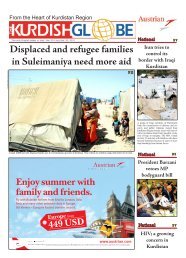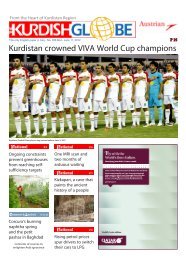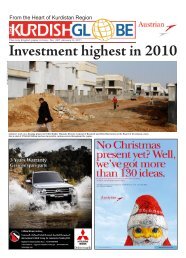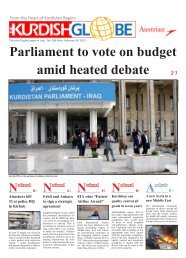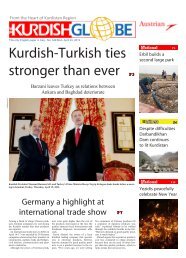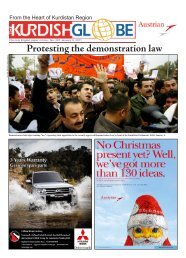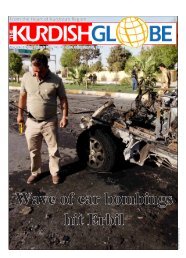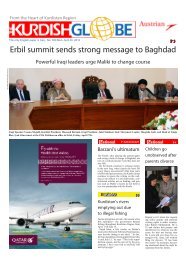Erbil: The host city of sports t ournaments - Kurdish Globe
Erbil: The host city of sports t ournaments - Kurdish Globe
Erbil: The host city of sports t ournaments - Kurdish Globe
You also want an ePaper? Increase the reach of your titles
YUMPU automatically turns print PDFs into web optimized ePapers that Google loves.
<strong>The</strong> <strong>Kurdish</strong> <strong>Globe</strong> No. 276, Saturday, October 09, 2010 13<br />
>><br />
in the eight-year Iran-Iraq<br />
War, as well as its huge<br />
military exhibition in the<br />
Kuwait invasion. Regardie<br />
ing the Iranian desire and<br />
position, it would be widele<br />
ly expected to reconstruct<br />
its weaponry treasure<br />
with new visions and targe<br />
gets. And this action may<br />
empower the permanent<br />
regime, and the regime’s<br />
counterattacks might cost<br />
more <strong>of</strong> the U.S and Israel.<br />
<strong>The</strong>n, prior to the attack<br />
it would be imperative to<br />
ponder who will be more<br />
at risk. Will the threat <strong>of</strong><br />
Iran stop with limited aerie<br />
ial strikes not followed by<br />
ground invasion? And what<br />
will happen to the U.S.’s<br />
unfinished projects in the<br />
region? Hence, again, limie<br />
ited airborne strikes won’t<br />
utterly stop the permanent<br />
Iranian regime, which is<br />
more <strong>of</strong> the purpose, from<br />
being a threat to Israel or<br />
U.S. interests.<br />
Many believe the U.S.<br />
military buildup in the rege<br />
gion is either preparation<br />
for a war on Iran or a way<br />
used by the U.S. to remind<br />
Iran <strong>of</strong> the superiority <strong>of</strong><br />
the West. And the U.S.<br />
for many years refused to<br />
involve direct diplomacy<br />
with Iran. This may give<br />
the assumption that the<br />
U.S. doesn’t want compe<br />
promise, whereas the U.S.<br />
<strong>of</strong>ficials accuse Iran <strong>of</strong> not<br />
giving much.<br />
Although a considerable<br />
majority, especially pro-<br />
Iranian countries, insists<br />
on peaceful resolutions,<br />
the international commune<br />
nity is divided into two<br />
groups. One is calling for<br />
a clean sweep strike--not<br />
only strikes on the Irane<br />
nian nuclear facilities, but<br />
a complete ground invase<br />
sion. And others persist<br />
on giving Tehran more<br />
time, assurances, or severe<br />
sanctions. Now, Iran is in<br />
an embarrassing situation.<br />
<strong>The</strong> media and Western<br />
countries have shed light<br />
on Iran more than ever.<br />
Iran is surrounded from all<br />
sides. Thousands <strong>of</strong> U.S.<br />
combat troops are in Iraq,<br />
and there is a huge chance<br />
<strong>of</strong> instituting a permanent<br />
U.S. military base in Iraq,<br />
which will back up if not<br />
all then definitely some<br />
U.S. armed interferences<br />
and intelligence operate<br />
tions. Kuwait, Qatar, Bahre<br />
rain, and U.S. bases in<br />
Central Asia (Uzbekistan<br />
and Kyrgyzstan) would<br />
assist any move from the<br />
West. From an American<br />
perspective, these make<br />
attacking Iran easier than<br />
ever, and lessons taught<br />
from the modern warfare<br />
in Iraq and Afghanistan<br />
can be implemented in the<br />
war on Iran. Even though<br />
President Obama’s adminie<br />
istration might to some<br />
extent look different from<br />
the Bush administration,<br />
the new administration,<br />
like Bush’s, maintains<br />
that the Iran crisis must<br />
be addressed utterly. And<br />
this mission cannot be acce<br />
complished through negote<br />
tiations, as Iran uses talks<br />
either to buy time so that<br />
more feats are gained in its<br />
nuclear research centers<br />
or to impose its wishes,<br />
which seemingly won’t<br />
be in the favor <strong>of</strong> Western<br />
powers.<br />
Will sanctions<br />
affect Iran?<br />
Sanctions imposed on<br />
Iran would not debilitate<br />
the country, and now Iran<br />
is stepping forward faster.<br />
Past decades prove that<br />
political and economical<br />
restrictions were inappe<br />
propriate, and Iran could<br />
survive and send its oppone<br />
nents shocking gestures.<br />
<strong>The</strong>refore, controlling Iran<br />
through sanctions is less<br />
realistic. America has not<br />
much in the way <strong>of</strong> direct<br />
links with Iran. <strong>The</strong> U.S.<br />
argues with Iran through<br />
public media; it pressures<br />
Iran by threatening capital<br />
sources, which were mostle<br />
ly European investors and<br />
bankers. <strong>The</strong> European<br />
Commission in 2006 repe<br />
ported that “the EU makes<br />
up 27.8% <strong>of</strong> Iran’s trade.”<br />
Meanwhile, the new sancte<br />
tions are expected to be put<br />
into place soon, “disruptie<br />
ing exports <strong>of</strong> gasoline and<br />
other refined petroleum<br />
products,” (Hosted News)<br />
might not stop Iran from<br />
moving on. Moreover, the<br />
EU is the regime’s biggest<br />
trading associate. It is a<br />
huge leap and risk for the<br />
EU to withhold its comme<br />
mercial relationships with<br />
Iran. Will EU countries<br />
submit to the U.S. and<br />
give up their pr<strong>of</strong>its? If<br />
so, the EU free and sovere<br />
eign states would be queste<br />
tioned, and they automatice<br />
cally would be counted on<br />
the U.S. side and dragged<br />
to become part <strong>of</strong> the next<br />
war.<br />
Why attack Iran?<br />
Iran may probably be occe<br />
cupied with similar justifice<br />
cation as used once against<br />
Saddam’s Iraq. Restriction<br />
<strong>of</strong> individual boundaries<br />
including religious freede<br />
dom, nuclear weapon proge<br />
grams, and minority rights<br />
possibly would be a worthwe<br />
while reason to invade<br />
Iran. Meanwhile, perhaps<br />
many could add two more<br />
serious reasons: interferie<br />
ing with Iraqi affairs and<br />
supporting or funding viole<br />
lent groups.<br />
One hardly can find any<br />
more debated topic other<br />
than the Iranian nuclear<br />
program. “From the afterme<br />
math <strong>of</strong> the U.S. failure in<br />
Iraq, Islamic Republic <strong>of</strong><br />
Iran has emerged as a rege<br />
gional superpower.” Thus,<br />
its attempts are calculated<br />
and become apprehensive.<br />
Though on more than one<br />
occasion, Iran—assurie<br />
ing <strong>of</strong> its peaceful purpe<br />
poses--has been portrayed<br />
as a growing threat. <strong>The</strong><br />
regime’s nuclear inquiry<br />
has covered most <strong>of</strong> the<br />
regimes faults, and it is<br />
misrepresented and mystife<br />
fied by the West.<br />
In 2010, Iran built two<br />
nuclear bombs. Iran does<br />
not have enough expertise<br />
to build nuclear warheads.<br />
Iran seeks nuclear weapons<br />
and is a violent country. If<br />
it gained nuclear weapons,<br />
the Iranian regime will<br />
pose wider threats, or they<br />
may put it into practice.<br />
Momentarily, its heard<br />
from all that a nuclear Iran<br />
is entirely repudiated by<br />
Western superpowers. Perhe<br />
haps these are a bunch <strong>of</strong><br />
perplexities that manipule<br />
lated the Western political<br />
arena. Barely a newspaper<br />
passes a day without news,<br />
mostly misleading and<br />
not based on solid details,<br />
about the Iranian nuclear<br />
programs, and they succe<br />
cessfully contribute in<br />
misinforming the public.<br />
Western nations’s threats<br />
and sanctions resulted in<br />
negative outcomes to this<br />
day. <strong>The</strong> menace is viewed<br />
bigger than it is in authente<br />
ti<strong>city</strong>. <strong>The</strong>n, will the West<br />
debilitate extreme relige<br />
gious zealots and the hardle<br />
liner President Mahmoud<br />
Ahmadinejad and bring an<br />
end to the Iranian nuclear<br />
program?<br />
Furthermore, human<br />
rights organizations conte<br />
tinuously accused Iran <strong>of</strong><br />
arbitrary imprisonments,<br />
high execution ratio, and<br />
restriction <strong>of</strong> religious<br />
freedoms. Still, no reason<br />
could evoke the call for an<br />
action against Iran as deafe<br />
eningly as its uranium enre<br />
richment procession. <strong>The</strong><br />
human rights activists perse<br />
sist on reporting massive<br />
abuses inside the country.<br />
However, Amnesty Interne<br />
national is not allowed to<br />
conduct research in Iran,<br />
China, Myanmar, North<br />
Korea, or Turkmenistan.<br />
<strong>The</strong> organization’s UK<br />
director, Kate Allen, clarife<br />
fied 30 years after the Isle<br />
lamic Revolution <strong>of</strong> Iran<br />
that wide use <strong>of</strong> torture<br />
and arbitrary detentions<br />
still exist, and Iran in 2008<br />
executed at least 346 peope<br />
ple. In addition, whereas<br />
security forces tightened<br />
their measures and methoe<br />
ods, Allen insisted that<br />
they continue recording<br />
changes.<br />
After the 2009 presidente<br />
tial election, Tehran brutalle<br />
ly suppressed opponents,<br />
human rights organizate<br />
tions, civil society activie<br />
ists, and journalists. Acce<br />
cording to Human Rights<br />
Watch reports, hundreds<br />
<strong>of</strong> Iranian activists fled to<br />
neighboring Turkey or rece<br />
ceived lengthy imprisonme<br />
ment, were sent to death,<br />
or are on death row. Any<br />
dissent could be followed<br />
by severe punishment,<br />
and the regime launched<br />
a huge operation against<br />
all means <strong>of</strong> communicate<br />
tion. Internet servers were<br />
kept under surveillance so<br />
as to minimize the flow <strong>of</strong><br />
information. Emails and<br />
phone calls were under<br />
scrutiny to crackdown on<br />
dissent. As stated by Joe<br />
Stork, deputy Middle East<br />
director at Human Rights<br />
Watch, “Journalists, lawye<br />
yers, civil society activie<br />
ists who used to speak to<br />
foreign media and human<br />
rights groups increasingly<br />
fear phone and Internet<br />
surveillance.”<br />
Moreover, Amnesty Inte<br />
ternational reported, “Slande<br />
der, defamation <strong>of</strong> state <strong>of</strong>fe<br />
ficials, insults to Islam and<br />
other aspects <strong>of</strong> freedom<br />
<strong>of</strong> expression, association,<br />
and belief are used to prose<br />
ecute those who dissent,<br />
including those seeking to<br />
promote and protect hume<br />
man rights.” And maltreatme<br />
ments reported by former<br />
detainees include sexual<br />
abuse, insult, torture, sleep<br />
deprivation, and “suspense<br />
sion from height.” Meanwe<br />
while, still-minority nate<br />
tions, Kurds, and religious<br />
minorities like believers in<br />
the Baha’i faith face huge<br />
discrimination and represse<br />
sion. Whereas hundreds<br />
<strong>of</strong> Kurds were executed or<br />
incarcerated due to holdie<br />
ing anti-regime slogans,<br />
a huge portion <strong>of</strong> Baha’i<br />
believers were forced to<br />
convert to Islam or they<br />
are not allowed to practice<br />
their faith unreservedly.<br />
Possible portrayals<br />
and outcomes<br />
<strong>of</strong> the war<br />
<strong>The</strong> occupation <strong>of</strong> Iraq<br />
would guide the possible<br />
war on Iran. Perhaps all<br />
modern wars share simile<br />
lar tactics to the Iraq War<br />
in one way or another. <strong>The</strong><br />
invasion <strong>of</strong> Iran, like Iraq,<br />
will begin with intensive<br />
air strikes on military base<br />
es, intelligence positions,<br />
and suspected zones, but<br />
how accurate they can<br />
be is dubious. <strong>The</strong> effort<br />
would be partially to sece<br />
cure the pass for ground,<br />
but the post-invasion situae<br />
ation would be more dise<br />
sastrous than Iraq due to<br />
population, geopolitical,<br />
and militarily differences.<br />
An internal revolution or<br />
coup is not expected, but<br />
Iranians might have a dese<br />
sire to replace the existing<br />
regime. Iran is a multinate<br />
tional and religious counte<br />
try, and if the occupation<br />
is triggered, components<br />
might ask for privileges.<br />
<strong>The</strong> 2003 Iraq subjugation<br />
would depict this point,<br />
evidently. Iraq for more<br />
than four years was on the<br />
edge <strong>of</strong> a civil war and<br />
sectarian division. Kurds,<br />
Sunnis, Christians, Assyrie<br />
ians, and Shiites claimed<br />
they had superiority, but<br />
there was not a true call<br />
for fraternity. Iraq was<br />
about to alienate into three<br />
regions, northern province<br />
es for the Kurds, southern<br />
provinces for the Shiites,<br />
and middle provinces for<br />
the Sunni population, and<br />
even the feeble federal<br />
Iraq was expected to disie<br />
integrate. <strong>The</strong>refore, Iran<br />
might divide into as many<br />
independent districts as<br />
nations, and religious<br />
groups exist in the counte<br />
try. Every group will take<br />
the stage and endeavor to<br />
obtain the occupiers’ suppe<br />
port to put its plans into<br />
effect. <strong>The</strong>refore, chances<br />
<strong>of</strong> waging a civil war reme<br />
main muscular. Kurds,<br />
with more than 7 percent<br />
population, might declare<br />
their free state; meanwe<br />
while, Sunnis, after more<br />
than 30 years <strong>of</strong> represse<br />
sion, will take the chance<br />
to build a Sunni region<br />
supported by Sunni neighbe<br />
boring countries, possibly<br />
most <strong>of</strong> the Arab World. In<br />
addition, many yet believe<br />
Iranians are well cultured;<br />
they may want the regime<br />
change, but the likelihood<br />
<strong>of</strong> an internal war or dishe<br />
harmony is weak. Iranians,<br />
unlike Iraqis, will not surre<br />
render and be lured into a<br />
civil war. <strong>The</strong>refore, most<br />
likely, a group <strong>of</strong> leading<br />
reformists who definitely<br />
could fulfill the invaders’<br />
expectations will lead the<br />
country.<br />
Furthermore, hundreds<br />
<strong>of</strong> thousands <strong>of</strong> sacrifices<br />
are needed to engage this<br />
huge alteration. <strong>The</strong> inve<br />
vasion <strong>of</strong> Iran will not<br />
destabilize just Iran or<br />
change the regime, but the<br />
entire region will face unpe<br />
precedented change. <strong>The</strong><br />
strongest anti-West power<br />
would die <strong>of</strong>f and the prese<br />
ence <strong>of</strong> U.S. and Western<br />
superpowers would double<br />
in the region. Meanwhile,<br />
Israel would protract its<br />
expansions fearlessly, as<br />
there would be no country<br />
to wipe it out on the world<br />
map. It is all positive up<br />
to this point, but we must<br />
compose Iranians’ capabe<br />
bilities. For more than 30<br />
years now, Iranians have<br />
worked on their intellige<br />
gence and military mace<br />
chine; therefore, a bloody<br />
and unparalleled counterae<br />
attack is expected.<br />
Bombings and destabile<br />
lizing the dwellers’ bases<br />
would be the Iranian prioe<br />
ority, as was the case in<br />
Iraq. Those thousands <strong>of</strong><br />
revolutionary guards and<br />
regime affiliates would<br />
finally find something<br />
worthy to do and resist.<br />
Temporarily, on one hand,<br />
U.S. forces in Iraq would<br />
be an attackable and realie<br />
istic target <strong>of</strong> the Iranians,<br />
perchance through re-dese<br />
stabilizing Iraq. No matte<br />
ter if Iran loses its laser<br />
guided missile arsenals, Jihe<br />
had would remain a lethal<br />
weapon. Iranian religious<br />
figures might announce a<br />
wide range Jihad against<br />
the West, and this will defie<br />
initely have lingering effe<br />
fects. In the Iraq-Iran War,<br />
Iran rerecorded tangible<br />
successes through using<br />
religion. Iranian soldiers<br />
were ready to cross mined<br />
fields and give their lives,<br />
imagining a safe place in<br />
heaven. On the other hand,<br />
other U.S. bases, embasse<br />
sies, and citizens in the<br />
East will be embattled.<br />
And while Kuwait, Qatar,<br />
Bahrain, and Central Asia<br />
U.S. bases would <strong>of</strong>fer a<br />
huge backup for troops on<br />
the ground, they will be on<br />
the Iranian hit list. Thus,<br />
the Iranian counter-<strong>of</strong>fense<br />
sives might exceed expecte<br />
tations.<br />
Israel, expectedly, would<br />
be the Iranian determined<br />
target. Many times the Irane<br />
nian disciplinarian Preside<br />
dent Ahmadinejad promie<br />
ised to “wipe Israel <strong>of</strong>f<br />
the map.” Undoubtedly,<br />
if Israel doesn’t initiate,<br />
definitely it will partake<br />
in the war; thus, its secure<br />
rity would be disturbed. If<br />
Tehran, by itself, could not<br />
compose attacks against<br />
Israel, its extreme organize<br />
zations are ready to carry<br />
out the mission. On one<br />
side, Hezbollah, from the<br />
south <strong>of</strong> Lebanon, will<br />
compile raids on Israel<br />
and involve Israel in a war<br />
not <strong>of</strong> its interests. On the<br />
other side--the Palestinie<br />
ian side--Hamas suicide<br />
bombers and local manufe<br />
factured missiles could<br />
create chaos in the heart <strong>of</strong><br />
Israel.<br />
Politically, when the war<br />
comes to the region, the<br />
political procession will<br />
take a vacation. For countle<br />
less years the war might<br />
wage, and the peace proce<br />
cess and IDP would stop.<br />
Not just Iranians, Iraqis, or<br />
Palestinians, but all would<br />
have to pay the price. <strong>The</strong><br />
new Middle Eastern orde<br />
der would depend on the<br />
newly established Iran, as<br />
Iranians will keep their rege<br />
gional influential role.<br />
Economically, the inve<br />
vasion will affect those<br />
Western countries that<br />
depend on oil. Iran is the<br />
fourth-largest oil produce<br />
er, and any attack on the<br />
country will undoubtedly<br />
affect its oil production.<br />
Iran--through its huge natue<br />
ural gas and oil reserves<br />
and exports--can affect<br />
markets. And if the counte<br />
try faced invasion, oil and<br />
gas prices will surely rece<br />
cord first-time, shockingly<br />
high prices. As the “USA<br />
Today” editorial board<br />
stated, oil prices might<br />
shoot to “$100 a barrel.”<br />
Meanwhile, “Iran grips<br />
the 20 percent <strong>of</strong> global oil<br />
supplies that are shipped<br />
through the Straits <strong>of</strong> Horme<br />
muz.” (Seumas Milne)<br />
<strong>The</strong>refore, Iran might try<br />
to seize the Straits and creae<br />
ate a global energy crisis.<br />
But the Iranian navy might<br />
be crippled by the invade<br />
ers. This quest would be<br />
backbreaking for the inve<br />
vaders, and Iranians may<br />
succeed for a short time.



